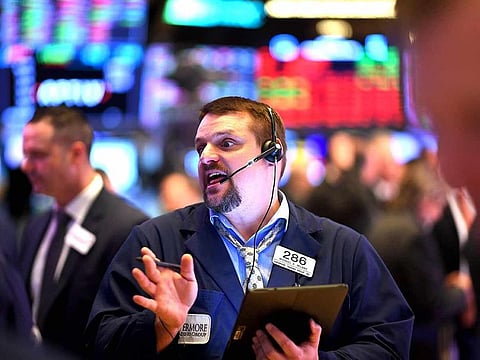Coronavirus panic wipes $6 trillion off world stocks this week
S&P500 in correction in just 6 days, European shares fall 3%-5%

LONDON: Coronavirus panic sent world share markets skidding again on Friday, putting them on course for their worst weekly fall since the 2008 global financial crisis, with almost $6 trillion wiped from their market value so far this week.
The rout showed no signs of slowing as Europe’s main markets slumped 3-5 per cent and the ongoing dive for safety sent yields on US government bonds, widely seen as the world’s most secure asset, to fresh record lows.
Hopes that the epidemic which started in China would be over in months and that economic activity would quickly return to normal have been shattered this week as the number of international cases spiralled.
Bets are now that the Federal Reserve will cut US interest rates as soon as next month and other major central banks will follow to try and nurse economies through the troubles and stave off a global recession.
“The volatility isn’t as surprising as the fact that it took so long to rear its head. However, the recent swings indicate the complacency that appears to have settled over markets during the earlier stages of the outbreak has been dislodged,” said Paras Anand, CIO, Asia Pacific at Fidelity International.
Disruptions to international travel and supply chains, school closures and cancellations of major events have all blackened the outlook for a world economy that was already struggling with the US-China trade war fallout.
MSCI’s all-country world index, which tracks almost 50 countries, was down more than 1 per cent and almost 10 per cent for the week — the worst since October 2008.
Losses on Wall Street deepened Friday morning following a bruising open. About 1510 GMT, the Dow Jones Industrial Average was down about 940 points, or 3.6 per cent, at 24,829.83. The broad-based S&P 500 sank 3.6 per cent to 2,872.72, while the tech-rich Nasdaq Composite Index tumbled 3.1 per cent to 8,304.42.
Europe’s airlines and travel stocks have plunged 18 per cent in their worst week since the 2001 9/11 attacks in the United States. The CBOE volatility index, often called the “fear index”, jumped as high as 47, its highest in about two years, well out of the 11-20 range of recent months.
The index, which measures expected swings in US shares in the next 30 days, typically shoots up to around 50 when bear market selling hits its heaviest, and approached almost 90 during the 2008-09 financial crisis.
Also Read: Coronavirus: Microsoft expects financial hit
Pandemic warning
In Asia, MSCI’s regional index excluding Japan shed 2.6 per cent. Japan’s Nikkei slumped 3.7 per cent on rising fears the July-August Tokyo Olympics in may be called off due to the coronavirus.
Indian stocks plunged, with the benchmark indexes posting their worst drop in more than four years, as the fast-spreading coronavirus roiled global markets. The broader NSE Nifty 50 index ended 3.71 per cent lower at 11,219.20 and the benchmark S&P BSE Sensex fell 3.4 per cent to 38,383.32.
For the week, the Nifty 50 index shed 7.3 per cent, while the Sensex dropped 6.8 per cent — their worst decline since the 2008-09 financial crisis.
“The coronavirus now looks like a pandemic. Markets can cope even if there is big risk as long as we can see the end of the tunnel,” said Norihiro Fujito, chief investment strategist at Mitsubishi UFJ Morgan Stanley Securities.
“But at the moment, no one can tell how long this will last and how severe it will get.” World Health Organisation Director General Tedros Adhanom Ghebreyesus said the virus could become a pandemic as the outbreak spreads to major developed economies such as Germany and France.
About 10 countries have reported their first virus cases over the past 24 hours, including Nigeria, the biggest economy in Africa.
The global rout knocked mainland Chinese shares, which have been relatively well supported this month, as new coronavirus cases in the country fell and Beijing doled out measures to shore up economic growth.
The CSI300 index of Shanghai and Shenzhen shares dropped 3.5 per cent, to bring its weekly loss to 5 per cent and the worst since April.
Oil prices languished at their lowest in more than a year having plunged 12 per cent this week — the worst since 2016 — while all the major industrial metals have dropped between 3 per cent and 6 per cent.
The appeal of guaranteed income sent high-grade bonds rallying. US yields — which move inversely to the price — plunged, with the benchmark 10-year note yield hitting a record low of 1.1550 per cent in frenzied European trading. It last stood at 1.1847 per cent.
That is well below the three-month bill yield of 1.43 per cent, deepening the so-called inversion of the yield curve. Historically an inverted yield curve is one of the most reliable leading indicators of a US recession.
Expectations the Fed will cut interest rates to cushion the blow are rising in money markets. Analysts say Fed funds futures are now pricing in about a 75 per cent chance of a 25 basis point cut at the central bank’s March 17-18 meeting.
The European Central Bank historically lags the Fed but it is now seen cutting by another 10 basis points by June.








